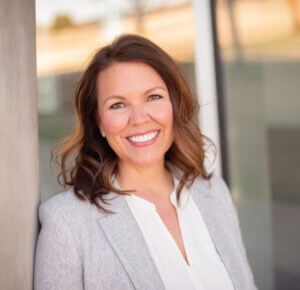Meet Dr. Sara Salkil, ACU alumna and program director for Abilene Christian University’s online COAMFTE-accredited Master of Marriage and Family Therapy (MFT) program.
ACU Roots
Sara Salkil got her bachelor’s degree in marketing from Oklahoma State, and later discovered her true passion for marriage and family therapy while earning her master’s at ACU. Inspired by her sister who also went through the MFT program, Sara quickly found her niche in the field and hasn’t stopped progressing her career since. After getting her doctorate from Texas Tech University, Sara returned to ACU where she worked in the residential program and served as the clinic director for the Marriage and Family Institute. Later, she was asked to develop the online program which will celebrate its 6th anniversary this June. “I wanted to give back to a program that gave me so much,” she reflects.
In the Field
Dr. Salkil is an approved supervisor with the American Association for Marriage and Family Therapy and is a licensed marriage and family therapist in both Texas and Ohio, where she currently resides and practices at a group private practice where she specializes in couples therapy. Sara enjoys staying active in the field by serving as a governor-appointed member for the Ohio licensing board for Counseling, Social Work & Marriage and Family Therapy (CSWMFT). She also is on the American Association for Marriage and Family Therapy Governance Leadership Identification Task Force which helps identify qualified members to serve on the board of directors and in various elected positions. Currently, she is also mentoring a licensee toward her supervisor credentials.
Online Opportunities
Since Sara’s time as a student until now, she has watched the industry evolve and improve, making it more accessible to obtain credentials and clinical hours through online learning. “Being able to take these courses online has opened so many doors,” she said. “Now so many more students, working adults, and people with families can benefit from an education while making a difference in their own communities.” Students have limited exposure through internships at traditional universities, but by getting their degree online, they now have opportunities to earn their clinical hours from across the nation and through various practices. She has also watched the demographic of students shift for the better. 50% of the online program identify as racially diverse, benefiting students as they interact with people from differing backgrounds.
Finding Community Online
Dr. Salkil makes community a priority for her online students and staff members, and ensures a hospitable environment for everyone who joins the online classroom. She has designed the program in a way that provides interaction between students and their professors, who post a weekly video for their students to connect with them.
Additionally, students facilitate community through their weekly group supervision meetings with 7 other students and a faculty member to discuss cases they work during their internships. This allows them to reflect on ethical issues and treatment planning while learning from their peers and becoming more informed on an array of real-world scenarios.
Personal Program Goals
Sara’s main goal for each of her students is to instill confidence in them once leaving her program. “We are training them to take and pass their licensing exams and then go out in the field to work as they follow a specific code of ethics,” she said. This is achieved by training them through evidence-based models of family therapy and through contemporary models. She also ensures that their work will be informed by their faith and values and has structured her courses to expose them to how their faith and values might bump-up against their work when put in ethical dilemmas. It’s important to her that her students leave feeling equipped to serve their communities through the roles they fill and the career paths they choose. “I believe we are the hands and feet of Jesus,” she reflected. “We might not mention our faith once, but we’re working very tenderly and that’s exactly the example of Christ that we see in the New Testament.
Want to learn more about ACU’s online degree programs? Check out acu.edu/online or contact us at 855-219-7300.

